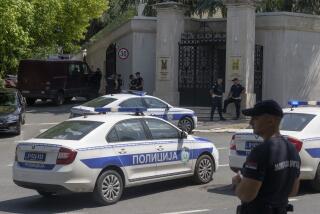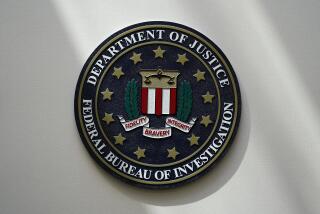U.S. Diplomat Charged as Spy in Yugoslavia
- Share via
VIENNA — In an incident that U.S. diplomats described as “outrageous,” an American envoy in the rump Yugoslavia was summarily arrested and held incommunicado for 15 hours by military police.
The diplomat was detained Thursday by plainclothes officers along with a former chief of staff of the Yugoslav army, Momcilo Perisic, according to Paul Denig, a spokesman for the U.S. Embassy in the Yugoslav capital, Belgrade. Perisic is now a deputy prime minister of Serbia.
The two men and two others, both Yugoslav, who were detained with them were charged with espionage. The allegation is that Perisic was passing documents to the diplomat. The diplomat “was physically assaulted and arbitrarily arrested,” Denig said.
The U.S. government is “outraged by the unwarranted detention of a U.S. diplomat,” he said.
The diplomat was seized and “roughed up” at a restaurant just outside Belgrade before being bundled off to a holding cell, Denig said. Diplomatic sources said they were unaware whether he and Perisic had exchanged any documents.
The diplomat was released Friday, but the others remained in custody early today.
Yugoslav military court officials identified the diplomat as John David Neighbor.
The incident is a sharp reminder of how far what remains of the Yugoslav Federation has to go before the rule of law and democratic principles become the norm there. It appears to have resulted from escalating tensions within the government in Belgrade, which is under intense pressure to hand over evidence and extradite individuals suspected of war crimes committed during the 1990s conflicts in Bosnia-Herzegovina and in Kosovo, a province of the dominant Yugoslav republic, Serbia. Washington has set a March 31 deadline for that cooperation to be complete.
At that point, the U.S. will evaluate Belgrade’s progress on several fronts and decide whether to continue to supply millions of dollars in foreign aid and endorse international monetary support for Serbia and Montenegro, Serbia’s last remaining partner in the federation. On Friday, before news of the arrest was widespread, William Taylor, coordinator for U.S. government assistance for Eastern Europe, had appeared on the independent Belgrade radio station B-92 and said that Yugoslavia had not yet done enough to meet U.S. demands.
As it is, the effort to comply with the U.S. requirements has put Serbian Prime Minister Zoran Djindjic, who is pushing an array of reforms, at odds with more nationalist Yugoslav President Vojislav Kostunica, who controls the army.
The military is one of the few institutions in Yugoslavia that still functions at the federal level. It has also remained largely unreformed since the era when strongman Slobodan Milosevic controlled the government. A number of prominent army figures are fearful that they will be extradited to the International Criminal Tribunal for the Former Yugoslavia in The Hague, where Milosevic is on trial, for their role in the bloody Balkan wars.
The arrest appears to have been a warning, largely directed at Djindjic, of the risk he runs if he complies with the United States’ demands. However, it also puts a strain on the fragile relationship between Belgrade and Washington.
Although that relationship has gradually improved since U.S. warplanes led the 1999 North Atlantic Treaty Organization airstrikes that forced Serbian forces out of the majority ethnic Albanian region of Kosovo and led to the toppling of Milosevic, the rapprochement is in its early stages.
The Yugoslav Foreign Ministry said in a statement that the diplomat’s arrest “could significantly influence the relations between our two countries.”
Djindjic was quick to condemn the incident.
“This is a blow to the international credibility of the country,” he said, adding that it was his understanding that allegedly secret documents being handed by Perisic to the diplomat had been planted.
Kostunica, who returned from a European Union meeting in Barcelona, Spain, late Friday, said he had been only “superficially informed” of the arrest.
Officials met late into the night at the Serbian government’s offices to determine how to handle the incident, while the U.S. ambassador expressed his dismay in no uncertain terms.
“The embassy has delivered forceful protests about these actions to the Yugoslav military and the Ministry of Foreign Affairs,” Denig said.
More to Read
Sign up for Essential California
The most important California stories and recommendations in your inbox every morning.
You may occasionally receive promotional content from the Los Angeles Times.













